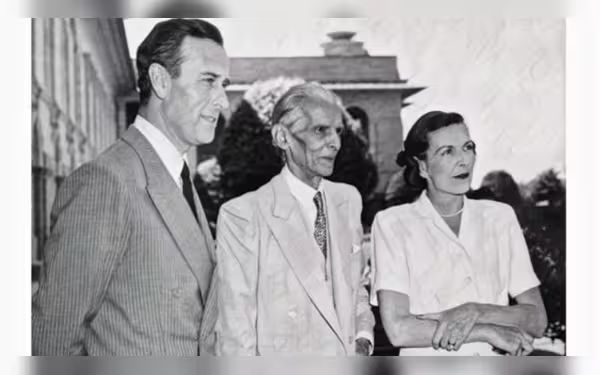Friday, October 4, 2024 05:23 AM
Lord Mountbatten's Role in Pakistan's Partition
- Prof Chawla offers a unique Pakistani perspective.
- Mountbatten's decisions led to significant turmoil.
- The book critiques existing narratives on Mountbatten.
 Image Credits: thefridaytimes
Image Credits: thefridaytimesExplore Prof Chawla's insights on Lord Mountbatten's influence during Pakistan's Partition.
The history of the Indian subcontinent is marked by significant events that shaped the destinies of millions. One of the most pivotal moments was the transfer of power from British rule to the newly formed nations of India and Pakistan in 1947. A key figure in this historical transition was Lord Mountbatten, the last Viceroy of India. His role has been the subject of much debate and analysis, particularly from a Pakistani perspective. A new book titled "Mountbatten, Cabinet Mission and Provincial Boundaries" by Prof Dr Mohammad Iqbal Chawla sheds light on this critical period, offering insights that have not been thoroughly explored before.
Prof Chawla, a distinguished historian, has dedicated his work to understanding the complexities surrounding the partition of India. His latest book focuses on Mountbatten's influence during the transfer of power, particularly in relation to the Cabinet Mission proposals and the delineation of provincial boundaries. The book argues that Mountbatten's decisions were instrumental in shaping the future of both nations, but they also led to significant turmoil, including widespread violence in Punjab.
What sets this book apart is its unique perspective. While there are numerous accounts from Indian and British viewpoints, Chawla provides a comprehensive Pakistani perspective that has been largely absent in previous literature. He critiques the existing narratives that often portray Mountbatten in a negative light, filling in the gaps with detailed analysis and primary source material. This includes documents from various archives in the UK and Pakistan, such as the Mountbatten Papers and the Jinnah Papers, which lend credibility to his arguments.
The book is structured into six chapters, each delving into different aspects of Mountbatten's role. The first chapter discusses the historiography of the Partition and highlights the gaps in existing literature. Subsequent chapters explore the political dynamics of Sindh, the accession of Balochistan, and the inclusion of the North West Frontier Province (now Khyber Pakhtunkhwa) in Pakistan. Chawla emphasizes Mountbatten's strategic use of a referendum in NWFP, which allowed the Muslim League to gain public support for Pakistan.
One of the most controversial topics addressed in the book is the Radcliffe Award, which determined the borders between India and Pakistan. Chawla suggests that while direct evidence of Mountbatten's involvement in the final draft of the Award is scarce, situational elements indicate that he exerted influence to make last-minute changes. This aspect of Mountbatten's role is crucial, as the Radcliffe Award has had lasting implications, including the ongoing Kashmir conflict.
"Mountbatten, Cabinet Mission and Provincial Boundaries" is not just a historical account; it is a critical examination of a complex period that continues to resonate today. Prof Chawla's work invites readers to reconsider the narratives surrounding the Partition and Mountbatten's legacy. By providing a thorough Pakistani perspective, the book enriches our understanding of this tumultuous time and encourages a more nuanced discussion about the events that led to the creation of two independent nations. As we reflect on this history, it is essential to recognize the multifaceted nature of these events and the diverse perspectives that shape our understanding of them.













